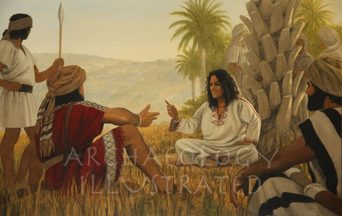 The Prophetess Deborah and Commander Barak Discussing Strategy - Archaeology Illustrated
The Prophetess Deborah and Commander Barak Discussing Strategy - Archaeology Illustrated
The English word prophet in the Old Testament comes from the Hebrew word “nabiy” which means “spokesman” or “speaker”. The Greek word for prophet is “prophētēs”, which can mean “one who speaks forth” or “advocate.” Prophets are also called “seers,” because of their spiritual insight or their ability to “see” the future, as directed by God.
This is the sixth post in the series.
Deborah
Deborah is the second prophetess, or female prophet in the series, Anna was the first.
Judges 4:4-5 (NLT)4 Deborah, the wife of Lappidoth, was a prophet who was judging Israel at that time.5 She would sit under the Palm of Deborah, between Ramah and Bethel in the hill country of Ephraim, and the Israelites would go to her for judgment.
Before the monarchy the nation of Israel was led by judges called and appointed by God to lead the nation. Deborah was the fourth Judge identified in the book of Judges. She is the only female Judge mentioned in the Bible.
At the time of Deborah’s administration as Judge of Israel he nation had been oppressed for twenty years by the king of Cannon, Jabin, because they had turned from the Lord.
Judges 4:1-3 (NLT)1 After Ehud’s death, the Israelites again did evil in the LORD’s sight.
2 So the LORD turned them over to King Jabin of Hazor, a Canaanite king. The commander of his army was Sisera, who lived in Harosheth-haggoyim.3 Sisera, who had 900 iron chariots, ruthlessly oppressed the Israelites for twenty years. Then the people of Israel cried out to the LORD for help.
Jabin had a very powerful army commanded by Sesira. Because this oppression was so severe the people, as they did every time they were oppressed by enemies, cried out to God for deliverance and relief.
As God’s appointed political leader of Israel Deborah had the authority to make political decisions but in addition she was also given the authority by God to speak for Him. In her political position as Judge she sent for one of the Commanders of Israel’s army, Barak, and then as a prophet of God told Barak that God commanded him to put a troop together to go out and fight Israel’s enemy, and he would be victorious
Judges 4:6-7 (NLT)6 One day she sent for Barak son of Abinoam, who lived in Kedesh in the land of Naphtali. She said to him, “This is what the LORD, the God of Israel, commands you: Call out 10,000 warriors from the tribes of Naphtali and Zebulun at Mount Tabor.7 And I will call out Sisera, commander of Jabin’s army, along with his chariots and warriors, to the Kishon River. There I will give you victory over him.”
Barak said that he would only go if Deborah went with him. That indicated some doubt on the part of Barak so Deborah then prophesied that he, Barak, wouldn't get the glory for the victory and killing the Commander of the Canaanite army. That glory would go to a woman.
Judges 4:9 (NLT)9 “Very well,” she replied, “I will go with you. But you will receive no honor in this venture, for the LORD’s victory over Sisera will be at the hands of a woman.” So Deborah went with Barak to Kedesh.
Judges 4:17-18, 21 (NLT)17 Meanwhile, Sisera ran to the tent of Jael, the wife of Heber the Kenite, because Heber’s family was on friendly terms with King Jabin of Hazor.18 Jael went out to meet Sisera and said to him, “Come into my tent, sir. Come in. Don’t be afraid.” So he went into her tent, and she covered him with a blanket. 21 But when Sisera fell asleep from exhaustion, Jael quietly crept up to him with a hammer and tent peg in her hand. Then she drove the tent peg through his temple and into the ground, and so he died.
Deborah then composes a song that attributes the glory of victory to the woman Jael.
Judges 5:24-27 (NLT)24 “Most blessed among women is Jael, the wife of Heber the Kenite. May she be blessed above all women who live in tents.25 Sisera asked for water, and she gave him milk. In a bowl fit for nobles, she brought him yogurt.26 Then with her left hand she reached for a tent peg, and with her right hand for the workman’s hammer. She struck Sisera with the hammer, crushing his head. With a shattering blow, she pierced his temples.27 He sank, he fell, he lay still at her feet. And where he sank, there he died.
The fifth chapter of Judges is the complete “song of Deborah”. It is unique in the Bible because it celebrates a military victory helped by two women: Deborah and Jael. Michael D. Coogan a lecturer on Hebrew Bible/Old Testament at Harvard Divinity School, writes that Jael being a woman "is a further sign that Yahweh ultimately is responsible for the victory: The mighty Canaanite general Sisera will be 'sold' by the Lord 'into the hand of a woman'

 RSS Feed
RSS Feed